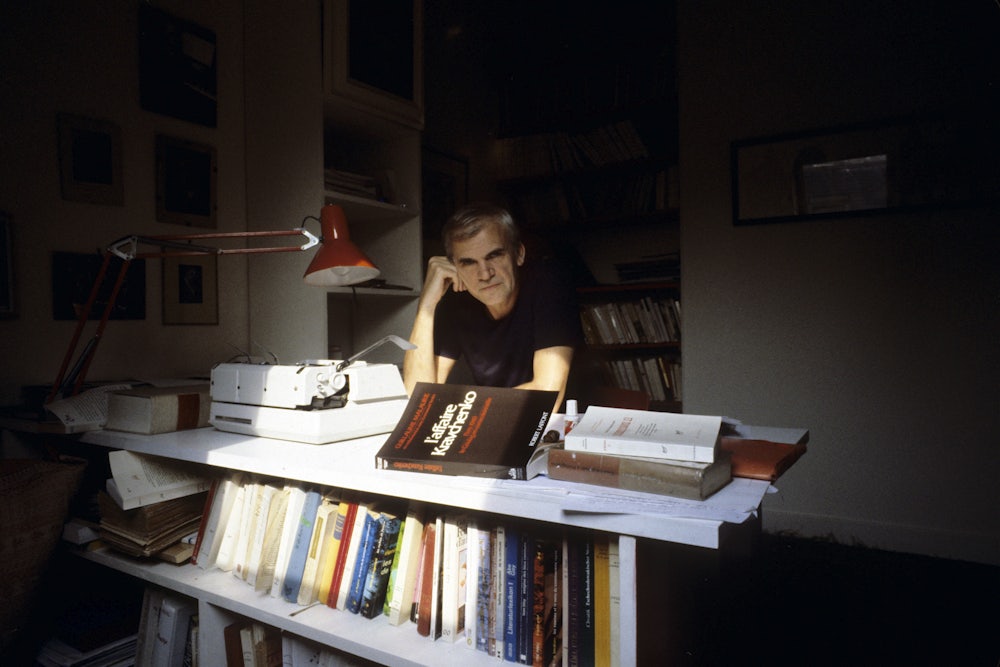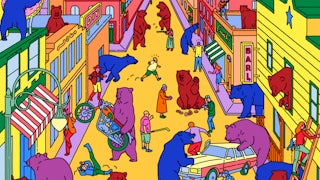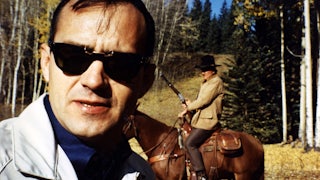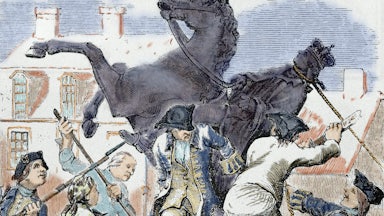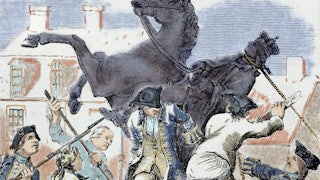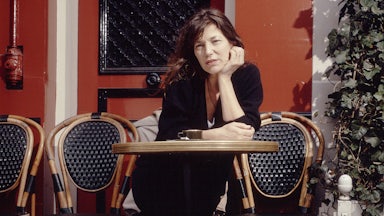If a writer lives long enough, they get a chance to glimpse their legacy in advance. Decorated with awards and lifetime achievements, they appear regularly on “best of the century” lists and see their work elevated to “classic” status. This is the kind of near-posterity that can be achieved in one’s lifetime. But literary afterlives are precarious, and a writer who might have departed with a fighting chance at permanence can find themselves quickly eclipsed. Who would have predicted, for instance, that the readership of Norman Mailer or John Updike (those great proliferators of American letters) would dwindle less than a generation after their deaths? Changes in demographics, politics, sensitivity levels, etc. can all contribute to this. The truth is that writers live at the mercy of such forces, and no critical consensus can hold them fast against shifting opinion.
Milan Kundera, who died yesterday at 94, found himself on the verge of such a shift. For decades, Kundera had been living invisibly in Paris. Having disappeared from public life decades ago, after swearing to never give an interview again, he was one of the most hermetic authors of our time. His books appear reliably on shelves around the world in dozens of languages, a perennial contender for the Nobel Prize. He never authorized a biography, refused to be photographed or quoted, and forbade his friends to speak about him in public. Notorious for controlling every aspect of his oeuvre, he was mercilessly corrective with translators, did not allow republication of early works, and even used his own Picassoesque sketches as artwork for his books. He planned to leave behind an immaculate canon, in which not even a comma is out of place.
The great theme that runs through his writing is the way in which the individual is drawn, unwillingly, into macro-historical affairs. The pair of essays that make up his most recent collection, A Kidnapped West: The Tragedy of Central Europe, locate Kundera at two important moments in his life, when his standing as an author would change: “The Literature of Small Nations” finds him in 1967, on the eve of the Warsaw Pact Invasion of Czechoslovakia; “The Tragedy of Central Europe,” in 1983, shortly before he would make the decision to disappear from public life. In both, the author is a besieged intellect: menaced by ideology, philistinism, commercialism, censorship, cultural and linguistic imperialism—finally, forced into exile.
Yet two developments threaten a pristine legacy. One is that, despite Kundera’s disdain for publicity, two biographies of him—both unsanctioned—have appeared in the last four years. The first, Milan Kundera: A Writer’s Life, by Jean-Dominique Brierre, mentions little of Kundera’s private life (and even earned Brierre a thank-you note from his subject). The second, Milan Kundera: His Czech Life and Times, by Jan Novák, is far less courteous, portraying Kundera as a scoundrel, a “moral relativist,” and at times, a collaborator, desperate to cover up the scandals of his past. But perhaps an even larger problem is the one that Kundera himself identifies in A Kidnapped West: the marginalization of literature in the culture and the precariousness of its future.
Kundera was born in Brno in 1929. As a young man, he joined the communist party, as many people did, in the aftermath of the Nazi occupation. He later described these early days, during which Stalin was still alive (he wouldn’t die until 1953), as an era of “lyrical delirium” and “the reign of the hangman and the poet.” Indeed, Kundera was a poet—not a novelist—at this time and composed three collections over the course of the decade: Man: A Wide Garden (1953), The Last May (1955), and Monologues (1957), all written in the style of panegyric socialist realism. These works, which have never been reprinted or translated, have since been excised from the Kundera corpus, and none of them appear in his official bibliography.
Still, Kundera was not the most orthodox of communists. He was kicked out of Prague’s Faculty of Arts for criticizing a high-ranking official in a correspondence with a friend and was subsequently ejected from the party. These events would provide the inspiration for his first novel, The Joke (1967), in which the protagonist, Ludvik, is expelled for writing “Optimism is the opium of mankind!... Long live Trotsky!” in a letter to a girl from his class, and is then sentenced to years of hard labor. For much of the 1960s, Kundera was a teacher at Prague’s film academy, FAMU, and was known for his packed and charismatic lectures. During this time, he wrote plays for the theater and composed the stories that would go into his first collection, Laughable Loves (1969).
Kundera seems to have remained a communist even into the late 1960s, long after many had lost any hope for transformation from within the regime. Though he never established himself as a “dissident” like his contemporaries Václav Havel and Ludvík Vaculík, he did publish a number of pieces against the regime’s censorship laws. One of these was “The Literature of Small Nations,” which was delivered as an address to the Czech Writers’ Congress in 1967, an event that put opposition to censorship at the forefront of Czech society, with writers openly demanding the reforms that would presage the Prague Spring.
The subject of the piece is the writer’s struggle for survival. Firstly, the struggle of Czech writers (within a German-speaking imperium) to transform their little vernacular into a language of literary distinction. Then the struggle against Nazism, which was succeeded by the struggle against the communist regime and its Russophilic policies. And finally, the struggle against the provincialism and ignorance of Czech society. Kundera was responding specifically to a comment made by a party member that Věra Chytilová’s absurdist comedy Daisies (1966) should have been banned for its lewdness and profanity.
The piece closes with the warning that “whoever might—through bigotry, or vandalism, lack of culture or narrow-mindedness—obstruct the cultural wheels accelerating now would be obstructing the very existence of this people.” Indeed, this is exactly what happened. The following summer, in 1968, the Soviet Union responded to the Czechoslovak government’s reforms by sending its machinery into the streets of Prague, crushing an era of intellectual and creative blooming.
In the years that followed, odiously known as “normalization,” Kundera found it nearly impossible to get his work published. He was fired from FAMU in 1972 for political reasons and wasn’t even allowed to drive a taxi. To make money, he wrote horoscopes under a pseudonym for a local paper and penned an adaptation of Diderot’s novel Jacques le fataliste for the theater (under another director’s name). Like most of his contemporaries, he was kept under surveillance by state security. His phone was bugged, and on one occasion in 1974, agents even broke into his apartment and photographed his manuscripts. One manuscript they likely didn’t find was Life is Elsewhere, which had been taken out of the country and published in France by Gallimard in 1973. It was the second of Kundera’s novels to be published in French, along with The Joke, which had been released a few years earlier, to rhapsodic praise.
In 1975 he finally defected, changing his country, his audience, and most amazingly, his language. He was 46 years old. The significance of this cannot be overstated. Few authors have ever pulled off this switch successfully, and Kundera is one of them, along with Beckett and Nabokov. However, unlike Nabokov, whose verbal dexterity flourished in English, leading to his greatest work, Kundera underwent the process of translating into French many of the novels he’d originally composed in Czech. Over the next few years, the other books, Farewell Waltz (1976) and The Book of Laughter and Forgetting (1979) were released. Kundera later personally revised the translations of his back catalog and insisted that he be known as a French writer, and that his work be regarded within the tradition of French literature. He was also reluctant to have many of his works translated back into Czech (Life is Elsewhere was only translated in 2016, 43 years after its initial release).
The Unbearable Lightness of Being, published in 1984, brought Kundera international recognition, achieving mainstream popularity and even spawning a film adaption in 1988, starring Juliette Binoche and Daniel Day-Lewis. It was a period of increased attention, not only for Unbearable Lightness, but also for the debate spawned by the publication in English of “The Tragedy of Central Europe.”
Looking back at the Hungarian revolt of 1956—a spiritual precursor to the Prague Spring—the essay revisits the threat posed to Europe by Russian imperialism and implicates the West in the failure to defend the small nations that constitute part of its own cultural inheritance, not just from aggressive neighboring powers and foreign spheres of influence, but from its own growing indifference. At stake in the invasion of any European nation, Kundera argues, is both the future of that nation, and the “spiritual notion” of the West itself: “The identity of a people and of a civilization is reflected and concentrated in what has been created by the mind—in what is known as ‘culture.’” In the past, Christianity was the source of common identity across Europe, even amongst its burgeoning and often warring nation-states. In a civilization where religion has “bowed out,” however, what remains is a common intellectual and artistic heritage.
The tragedy of the Cold War was first in the bisection of Europe, through which nations that had been firmly within the West culturally suddenly found themselves as part of the East. But it was also in the failure of the West to recognize that the colonization of Central Europe—which gave us Kafka, Musil, Freud, structuralism—represented a breakup of its own culture. In Western Europe, Kundera argues, this severance was seen as sad, but ultimately peripheral. The partitioning of Europe was regarded as a geopolitical tragedy, perhaps, but not a cultural one, because the West no longer takes its own culture seriously:
In Paris, even in a completely cultivated milieu, during dinner parties people discuss television programs, not reviews. For culture has already bowed out. Its disappearance, which we experienced in Prague as a catastrophe, a shock, a tragedy, is perceived in Paris as something banal and insignificant, scarcely visible, a non-event.
At the center of the West’s cultural history is its literature, which the West has turned its back on. The same grievance reappears in Kundera’s later nonfiction, especially in his three book-length essays on the state of literature—The Art of the Novel (1986), Testaments Betrayed (1993), and The Curtain (2005)—which situate themselves in the twilight of the novel’s cultural centrality. “Has not the novel for some time already been living on death row?” Kundera posits in Testaments Betrayed. In the same piece, written in response to the Fatwa against Salman Rushdie in 1989, he writes of “Europe’s incapacity to defend and explain” the novel from its enemies: “Europe, the ‘society of the novel,’ has abandoned its own self.”
Accepting the Jerusalem Prize in 1985, Kundera described the novelist as “one who, according to Flaubert, seeks to disappear behind his work … that is, to renounce the role of public figure.” In a later interview (included in The Art of the Novel), Kundera wrote: “In July 1985, I made a firm decision: no more interviews. Except for dialogues co-edited by me, accompanied by my copyright, all my reported remarks since then are to be considered forgeries.” In the Novak biography, we’re told that in the 1990s Kundera underwent a “liquidation” of all his old work—shredding letters, notebooks, correspondences, as well as any unfinished or unpublished manuscripts. While Novak concedes that Kundera was “fully entitled” to do what he wished with his own work, his decision to destroy any imperfections from his past couldn’t more neatly exemplify his approach to his own biography. “The least an author can do for his works,” he affirms in The Art of the Novel, is “sweep around them.”
The Novak biography attempts to piece together the scraps that remain, and naturally this means recounting a few scandals. The most sizable occurred in 2008, when Adam Hradilek, a historian and columnist for the Czech magazine Respekt, discovered a file in declassified police archives which revealed that in 1950, when Kundera was still a student at FAMU, he informed on a young man named Miroslav Dvořáček, whom he believed to be a “diverzant” (divergent, or enemy agent). Dvořáček served as a pilot in the air force and was expelled for “untrustworthiness” after the communist coup in 1948. He defected to Germany and later returned to Czechoslovakia as an agent of American counterintelligence. On the evening of March 14, 1950, Dvořáček was staying in the dormitory of a young woman who was dating a mutual friend of Kundera’s. The friend told Kundera, shortly after which, according to the police report: “A student, Milan Kundera, born 1.4.1929 in Brno” presented himself at the local station and informed the authorities. Dvořáček was imprisoned for over a decade and sentenced to years of hard labor.
Novak even detects an echo of the story in Kundera’s sophomore novel, Life is Elsewhere, when Jaromil, the Stalinist poet-protagonist, notifies the police that the brother of his girlfriend intends to betray the revolution by defecting. Jaromil does this out of a sense of “duty,” and as he exits the station, he finds himself elated (“He breathed the cold air, felt exuberant with the virility that flowed from his every pore”) for having become not just a man of ideas, but a man of action. The young Jaromil is a true believer, and by all accounts, so was Kundera at the time.
This story, though largely unknown outside of the Czech Republic, changed many people’s perception of Kundera (who maintained it was false) and it had dogged him ever since. Among Czechs, his name could hardly be brought up without mention of his communist past, his decision to leave the country, his refusal to return, and his defensive efforts. Indeed, one of the ironies of Kundera’s efforts to become anonymous was that it generated even more interest in his private life, often at the expense of his work. The bid to expunge biography produced the opposite effect.
Writers may live two lives. There’s the life of the mind and there is the life that is lived out in the world. These rarely exist harmoniously and without contradiction. In his own lifetime, Kundera endeavored to vanish as a man and remain only a name, a voice. The written life, he maintained, is the only life, and any intervention of biography is a threat to the integrity of the work. As he put it in The Art of the Novel: “The moment Kafka attracts more attention than Joseph K., Kafka’s posthumous death begins.” But posthumous death is beyond any writer’s control, and there is no amount of image management, good publicity, good reviews, or paper shredding that can prevent it.
The course of the last decade saw a shift in the standing of both Kundera and his work, especially in the Czech Republic. I have lived in Prague for many years now, and from time to time I have asked Czechs what they think of Kundera. Many were indifferent—they simply hadn’t read him, or didn’t care to; and those who had seemed to agree that his work had not held up over time.
Kundera may have been correct that Western culture is bowing out of its commitment to its literary heritage. It would seem inevitable that in a culture that no longer takes its literature seriously, the writer is doomed to invisibility, though not in the way Kundera might have hoped. The novelist may seek to disappear behind their work, à la Flaubert, but what happens when the novel disappears? If the West is indeed forgetting the novel, then it is also forgetting its novelists. Kundera himself understood this only too well, and his work remains a testament to the writer’s stubborn struggle to survive.
